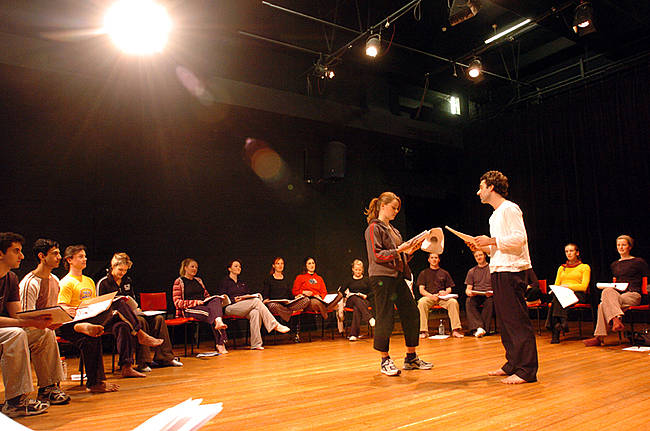As readers of this blog know, my biggest passions are writing and theatre. I've been involved with stage theatre since I was a young child, and consider theatre to be my home. Two weeks ago, during a series of interviews (which can be found here: christophermannino.com/about-the-author.html ) I was reminded that my writing process is more disjointed than some writers'. Because I only write part-time, I don't have the time to sit down and develop a full story from start to end without pausing. I now realize that my success as a writer is due in large part to my background as an actor. I recommend anyone who writes, especially if they work another job, should try out for a play. For those worried about performing, try community theatre- no prior experience needed, and no pressure. Here's how theatre can help your writing:
1. Theatre in a non-linear process
If you don't have time to write a book from start to stop, you're not alone. Part-time writers need to be able to write their story whenever they get a chance- picking up the story wherever they left off. My advice: become an actor in a play. The more shows you're in, the more you'll get used to thinking non-linearly. Even if a play takes place in chronological order, you never practice a show like that. You'll pick up in the middle, work one scene, then start a different scene. You need to be able to keep the chronology of a play in mind when starting in the middle. Eventually this skill becomes second-nature, and will allow you to pick up a draft in the middle with no trouble at all.
2. Theatre builds dialogue skills
Have trouble writing believable dialogue? Plays and musicals are nothing BUT dialogue. You get used to language in a new way, by not just speaking it, but practicing speaking in different ways. This builds skill at writing and using dialogue effectively in any setting. Trying to incorporate appropriate methods of speaking into your characters voices can be very helpful.
3. Theatre builds confidence
A number of authors at Muse It Up have mentioned feeling hesitant about in-person events. The image of a reclusive writer, afraid of the world, is perhaps overblown, but to be fair- writing is an insular process. What better remedy to isolation than jumping onstage in front of strangers. Sound terrifying? In a way, it's not you up there at all. Drama provides a "mask" - in that it's your character onstage, not you at all. If I was aked to read a script onstage I feel fine, but if I was aksed to tell my own story I might get nervous. I reach into myself, and draw on that "mask" - becoming the character of myself. It alleviates any nerves I might feel.
For all those reasons, plus the pure fun of it, give yourself something new to try- and go audition for a play. Here's my school's website- to give an example of what I do with my drama kids: http://itshotaspancakes007.wix.com/rooseveltdrama
Finally, if you haven't entered yet- the contest is on! Entries have started coming in, some silly, some amazing. Can you name a Dragon?
Enter a suggested name and you might see your Dragon in print!
Details: http://www.christophermannino.com/events-and-contests.html



Great advice.
ReplyDeleteHey, Chris.Well, I definitely agree with 2 and 3 above, not so sure about # one. Maybe it's because I'm a linear person, happiest if I can traverse from point A to E by stopping off at B,C,and D. LOL
ReplyDeleteI've taught middle and high school plays and done a bit of performing myself. I think think theatre experience helps a writer also from the standpoint of setting and movement. When you're directing a play or performing, you have to know where everyone is at all times. The action has to make sense.
In school, church, and community theatre, you have to make adjustments for your actors' schedules, so yes there are times a scene has to be taken out of sequence. I know movies shoot this way. Something I've never understood! LOL But then I'm a linear person. And Chris, I don't know that you're in the minority. I've heard of lots of folks, pantsers especially, who write scenes all willly-nilly and then somehow magically tie them all together. We all have to find what works for us. :) I'll be sharing. :)
Marsha- perhaps my term non-linear was misplaced- it's ok to write in order- but it's more about having to start and stop constantly. I might write one chapter and then not get to the next chapter for another month with no time in between- and being able to start and stop is a skill I definitely picked up from my experience as an actor. :-)
DeleteChris, interesting post. I was big into theater and acting as a teen and young adult. Among other things I spent three summers at National Music Camp as a theater major, studied ballet for years, and participated in amateur theater in my twenties. I do write good dialogue -- never thought about how it related to my acting experience. When I write, I generally see the scene unfolding on a mental movie screen first. I'm pretty linear in terms of my writing -- and a lot of other things -- usually starting at the beginning and write through to the end. I make notes on future scenes that I can fill in later.
ReplyDeleteWhen I used to go to the video store, I'd start looking for movies from the A's. Then I discovered I missed a lot of movies starting with the later letters (Star Trek for one) and started alternating starting backward from Z.
I've been hoping you'd write a post on this issue for awhile-- so glad you did. I had read an article in which the author recommended writers take acting classes, but he didn't elaborate why!
ReplyDeleteBest of success in all that you do.